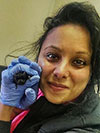Manisha Bhardwaj

Supervision
Evelina Augustsson – PhD in Biology and Ecology: “Feeding ecology and interference competition in wild boar and other ungulates,” Swedish University of Agricultural Sciences, Sweden. In progress
Charlotte Hansson –Masters of Wildlife Ecology: “Demonstrating the effectiveness of electrical fencing to reduce wild boar damage of crops,” Swedish University of Agricultural Sciences, Sweden. In progress
Siboniso Thela – Masters of Science – Zoology: “Seasonal use and mortalities of mammals along the Phalaborwa–Hoedspruit railway line of Balule Nature Reserve, South Africa,” Tshwane University of Technology, South Africa. In progress
Denice Lodnert – Masters of Wildlife Ecology: “Evaluating the effectiveness of using acoustic signals to reduce ungulates visitation to feeding sites,” Swedish University of Agricultural Sciences, Sweden. Completed 2021
Elina Berte – Masters of Wildlife Ecology: “Analysing the personality of ungulates to noise stimuli,” Swedish University of Agricultural Sciences, Sweden. Completed 2021
Selected publications
1. Bhardwaj, M., Soanes, K., Lahoz-Monfort, J. J., Lumsden, L. F., & van der Ree, R. (2021) Insectivorous bats are less active near freeways. PLoS ONE 16(3): e0247400. doi: 10.1371/journal.pone.0247400
2. Plaschke, M., Bhardwaj, M, König, H.J., Dobias, C., Wenz, E., Ford, A.T. (2021). Green bridges in a re-colonizing landscape: Wolves (Canis lupus) in Brandenburg, Germany. Conservation Science and Policy. doi: 10.1111/csp2.364
3. Bhardwaj, M., Seiler, A., Olsson, M. (2020). Ungulate use of non-wildlife underpasses. Journal of Environmental Management, 273, 111095. doi: 10.1016/j.jenvman.2020.111095
4. Seiler, A., Bhardwaj, M. (2020). Wildlife and traffic: An inevitable but not unsolvable problem? In: F. M. Angelici & L. Rossi (eds) Problematic Wildlife II: New Conservation and Management Challenges in the Human-Wildlife Interactions. Cham: Springer International Publishing. p. 171-190. doi:10.1007/978-3-030-42335-3_6
5. Bhardwaj, M., Soanes, K., Lahoz-Monfort, J. J., Lumsden, L. F., & van der Ree, R. (2020). Artificial lighting reduces the effectiveness of wildlife-crossing structures for insectivorous bats. Journal of Environmental Management, 262, 110313. doi: 10.1016/j.jenvman.2020.110313
6. Bhardwaj, M., Soanes, K., Lahoz‐Monfort, J. J., Lumsden, L. F., & van der Ree, R. (2019). Little evidence of a road‐effect zone for nocturnal, flying insects. Ecology and Evolution, 9(1), 65-72. doi: 10.1002/ece3.4609 Among the top 10% most downloaded papers in Ecology and Evolution in 2018-2019
7. Soanes, K., Sievers, M., Chee, Y. E., Williams, N. S., Bhardwaj, M., Marshall, A. J., & Parris, K. M. (2019). Correcting common misconceptions to inspire conservation action in urban environments. Conservation Biology, 33(2), 300-306. doi: 10.1111/cobi.13193 Among the top 10% most downloaded papers in Conservation Biology in 2018-2019
8. Bhardwaj, M., Soanes, K., Straka, T. M., Lahoz-Monfort, J. J., Lumsden, L. F., & van der Ree, R. (2017). Differential use of highway underpasses by bats. Biological Conservation, 212, 22-28. doi: 10.1016/j.biocon.2017.05.022
9. Bhardwaj M, Dale CA, Ratcliffe LM. (2015). Aggressive behavior by Western Bluebirds (Sialia mexicana) varies with anthropogenic disturbance to breeding habitats. Wilson Journal of Ornithology, 127, 421-431. doi: 10.1676/14-087.1
Links
https://www.researchgate.net/profile/Manisha_Bhardwaj6